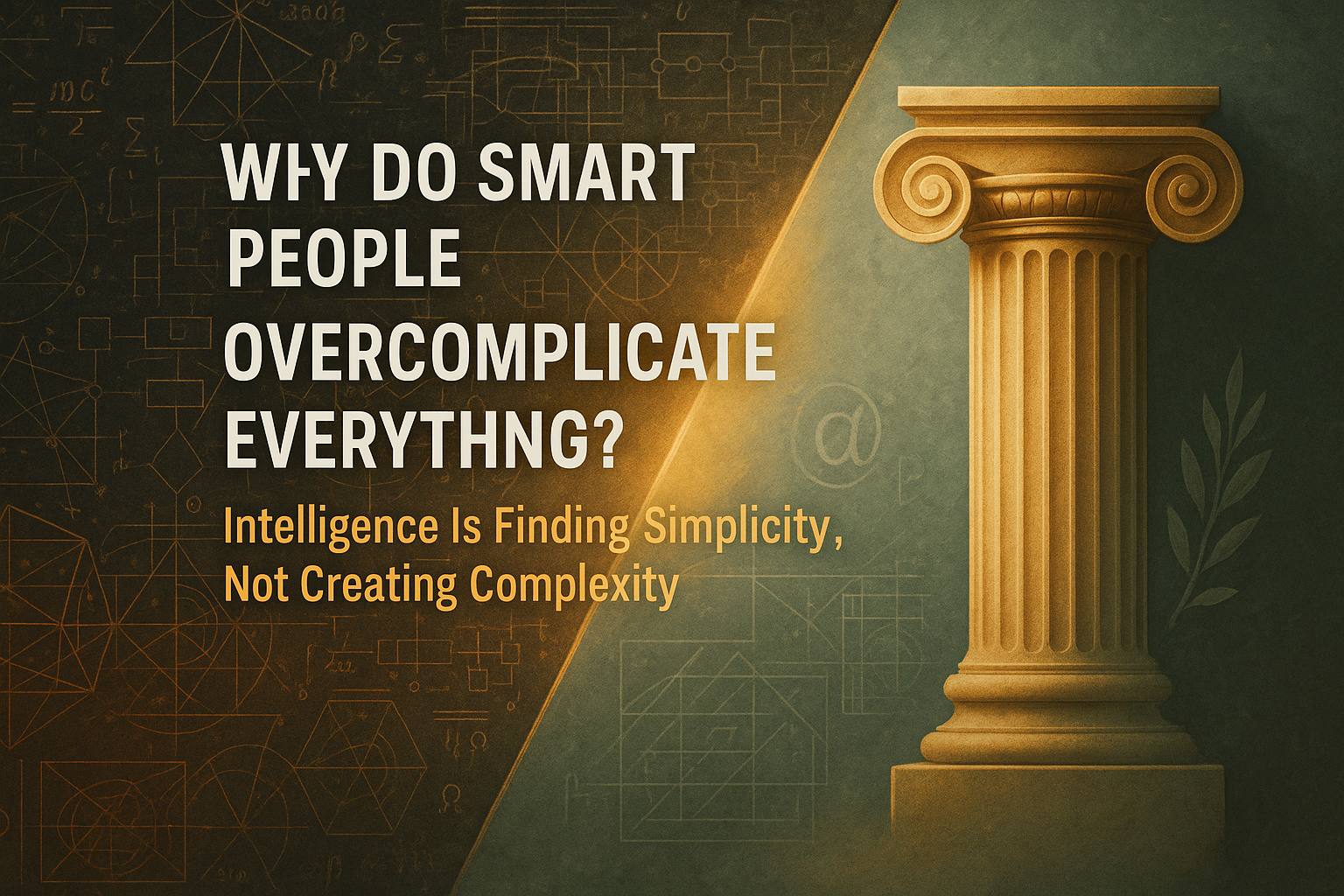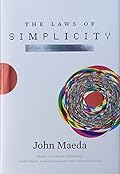
Why Do Smart People Overcomplicate Everything?
By Derek Neighbors on November 22, 2025
I watched a product team present their roadmap to the board. Forty-three slides. Color-coded swim lanes. Dependencies mapped across six quarters. Feature matrices cross-referenced with market segments. Technical architecture diagrams explaining implementation complexity.
Halfway through, the CEO stopped them. “What are we actually building and why?”
Long pause. Someone clicked back through slides.
Finally: “We’re making it easier for customers to find what they need.”
Three months of planning. Forty-three slides. Sixteen people involved.
To arrive at what should have been a single sentence.
The Myth
We’ve convinced ourselves that intelligence demonstrates itself through complexity. That sophisticated problems demand sophisticated solutions. That if the answer seems simple, it must be insufficient.
Elaborate thinking signals intellectual horsepower. Complex frameworks prove you’ve done the work. Technical jargon shows you’re serious. Multi-step processes demonstrate thoroughness.
Simple answers? Those look like you didn’t try hard enough.
This seems logical. Complex problems should require complex solutions, right? If it were easy, everyone would have figured it out already. The difficulty must live in the solution, not just the problem.
So we build. Elaborate architectures. Sophisticated models. Intricate processes. Frameworks that need frameworks.
And we call it intelligence.
But let’s be clear about what we’re actually talking about:
Intelligence isn’t IQ or knowledge accumulation. It’s the capacity to identify what matters and discard what doesn’t. To see clearly and communicate honestly.
Complexity isn’t difficulty or sophistication. It’s unnecessary elaboration that obscures rather than reveals. The distinction matters: quantum mechanics is difficult. Forty-three slides to say “make it easier for customers” is complexity.
Simplicity isn’t simplistic or reductive. It’s distilling to essence without losing truth. Feynman explaining quantum mechanics isn’t dumbing it down. It’s understanding deeply enough to communicate clearly.
Wisdom (sophia) is the ability to cut through noise and see what’s actually true. Then having the courage to say it plainly.
The confusion happens when we mistake complicated for complex, and simple for simplistic. When we think difficulty requires elaborate explanation.
The Reality Check
Here’s what actually happens in meeting rooms across every organization:
Someone presents a straightforward solution. “We should just do X.”
Awkward silence.
Then someone else: “But what about…” and adds a layer of complexity.
Someone else builds on that. Another caveat. Another consideration. Another framework.
Two hours later, you have an elaborate plan that’s lost the original insight entirely.
Three months after that, you’re back to the simple solution. After the expensive detour through complexity. Strategic imperfection would have gotten you there on day one.
I’ve watched this pattern repeat for twenty years.
Engineers overcomplicate. Full stop. Doesn’t matter if they’re junior or senior. The junior uses three design patterns because that’s all they know. The senior uses seven because they know more ways to be sophisticated. Both solving the same problem that needed twenty lines of straightforward code.
The early-career consultant delivers a fifty-page analysis. The veteran delivers sixty pages because they have more frameworks to reference.
The new manager implements a complex performance management system. The experienced leader implements an even more complex one because they’ve seen more systems to combine.
Experience doesn’t cure complexity addiction. It gives you more tools to feed it.
PowerPoint culture accelerates this.
Jeff Bezos banned PowerPoint at Amazon. Forced teams to write six-page memos instead. Why? Because writing demands clarity. You can’t hide behind bullet points and colorful charts. A sentence either makes sense or it doesn’t.
Alex Hormozi preaches the same thing: When you have to write it down on a single page, the bullshit evaporates. You’re forced to think clearly enough to explain simply.
PowerPoint lets you gesture at complexity without ever making a coherent point. Each slide adds another layer. Another framework. Another dimension to consider. By slide thirty, nobody remembers the core idea, if there ever was one.
Writing forces you to say what you mean. Slides let you perform sophistication without substance.
But here’s the tell: Consultants don’t charge by effectiveness. They charge by complexity. Simple advice doesn’t justify the fee. The elaborate deliverable justifies the cost, regardless of whether it works.
Client satisfaction gets measured by the weight of the binder, not the quality of the outcome.
Richard Feynman, the physicist who could explain quantum mechanics to anyone, said he learned more from watching how people failed to understand than from formal study. Not because he dumbed things down. Because he understood them deeply enough to find the simple truth within the complexity.
Some problems ARE inherently complex. Quantum mechanics. Brain surgery. Distributed systems at scale. Organizational transformation.
But here’s the test: Does the complexity live in the problem or the explanation?
Feynman’s quantum mechanics remained mathematically complex. His explanation became simple. The difficulty stayed where it belonged. The communication became clear.
Most business problems aren’t quantum mechanics. They’re simple problems wrapped in sophisticated language to signal intelligence. The complexity doesn’t live in the problem. It lives in our need to appear smart while solving it.
Einstein supposedly said
If you can’t explain it simply, you don’t understand it well enough.
Not all complexity, but most. In my twenty years watching teams build software, launch products, and solve business problems, I’d estimate 80% of the complexity I’ve seen was unnecessary. Added for protection, status, or insufficient understanding. The remaining 20%? That was real difficulty meeting real problems.
The test isn’t whether your domain is complex. It’s whether you’re adding complexity or revealing what’s already there. Complexity in service of truth versus complexity in service of ego. One is sometimes necessary. The other is always vice.
The Hidden Cost
The complexity addiction extracts a toll most people never calculate.
First, it becomes camouflage. When you hide behind sophisticated language and elaborate frameworks, nobody can challenge you. Not because your thinking is sound. Because it’s too complex to question without looking like you don’t get it.
Elaborate explanations protect you from exposure. If they can’t follow your reasoning, that’s their limitation, not your confusion.
Second, it protects ego. Simple solutions don’t demonstrate how smart you are. Anyone could have thought of that. But complex thinking? That proves your intellectual capacity. That shows your value. It’s the same impulse that makes people dismiss the madness of excellence when it shows up as relentless simplicity.
Sophistication becomes a status signal. Your worth measured by the complexity you can create and manage.
Watch what happens to your thinking when no one’s watching. When there’s no audience to impress. When results are all that matters.
Suddenly, solutions get simpler.
Third, it sacrifices effectiveness. Complex solutions are harder to implement. More moving parts mean more failure points. Difficult to maintain. Difficult to iterate. The distance between problem and solution grows until you’re no longer sure if you’re solving the original issue or managing your solution.
Fourth, it paralyzes teams. When the approach is too complex for anyone to fully grasp, implementation stalls. Coordination becomes impossible. Simple actions require elaborate orchestration. The organization optimizes for looking smart over getting results.
But here’s the character cost that matters most: You’re trading effectiveness for the satisfaction of feeling intelligent. This is akrasia, choosing ego over service, sophistication over usefulness.
That’s not intelligence. That’s insecurity.
And this isn’t tactical advice about what works better. This is virtue.
Choosing complexity to protect your ego is cowardice disguised as sophistication. Choosing simplicity despite the vulnerability is courage. Using your rational capacity to obscure truth rather than reveal it is a misuse of your distinctive human function.
The Stoics understood this distinction: The complexity of your solution is adiaphora, indifferent, external, not in your full control. But clarity of thought? That’s entirely within your control. That’s your prohairesis, your moral choice.
You don’t control whether the problem is complex. You don’t control whether others understand. But you control whether you’re choosing complexity to protect your ego or embracing simplicity to serve truth. That’s the only part that’s yours. That’s where character lives.
Everyone with the capacity for clear thought owes its use. Slave or CEO. Junior or senior. Privileged or not. This isn’t about effectiveness. It’s about character.
Complexity as ego protection is vice. Simplicity as truth-telling is virtue.
The Truth
The ancient Greeks had a concept for what we’ve forgotten: true wisdom reveals itself through simplicity, not complexity.
sophia, the Greek word for wisdom, wasn’t about knowing more or thinking in more elaborate ways. It was about seeing clearly. Cutting through noise to identify what’s actually true.
Why does wisdom reveal itself through simplicity? Because understanding means seeing the structure beneath the surface. The person who truly understands sees which parts are essential and which are decoration. They can explain the mechanism without the ornament.
Complexity obscures. Simplicity reveals. Not because simple things are easier to understand, but because understanding lets you see what’s actually there versus what you’ve added. Plato would say complexity is the shadows on the cave wall. Simplicity is turning to face the light and seeing the Forms directly.
The mark of genuine understanding is the ability to distill complexity into essential truth. Not because you’ve removed difficulty, but because you’ve removed distraction.
Occam’s Razor, the principle that the simplest explanation is usually correct, has roots in Greek philosophy. Medieval scholars formalized it, but the Greeks lived it. Unnecessary complexity was seen as intellectual vanity. Elegance was the hallmark of truth.
Socrates built his entire philosophy on stripping away false sophistication. “The only true wisdom is knowing you know nothing.” Not because knowledge doesn’t exist. Because most of what poses as knowledge is elaborate confusion.
Marcus Aurelius, writing to himself in Meditations: “If it’s not right, don’t do it. If it’s not true, don’t say it.”
Clarity of thought was a Stoic virtue. Confusion was evidence of muddled thinking, not complex reality.
Here’s what real mastery looks like, and the boring truth about excellence is that it’s far less glamorous than you’d expect:
The ability to take what’s complex and make it simple. To communicate without jargon. To solve directly without elaborate process. To create solutions that feel obvious in hindsight.
That’s the test. If it doesn’t feel obvious after you explain it, you probably haven’t understood it yet.
The Shift
Changing this pattern requires recognizing it in yourself first.
The Recognition:
When do you add complexity? Not when the problem requires it, when do you need it?
What are you trying to prove? Who are you trying to impress? What simple truth are you obscuring with sophistication?
Ask yourself:
- Am I making this complex because it needs to be, or because I want to?
- Would I use this approach if no one was watching?
- Am I optimizing for appearing smart or being effective?
- Can I explain this to someone outside my field?
That last one is the killer. If you can’t explain it simply to an intelligent person outside your domain, you probably don’t understand it as well as you think.
The Discipline:
This is character work, not intellectual work.
It requires andreia, the Greek word for courage. The willingness to risk looking too simple. To present the obvious answer and let it stand.
It requires sophrosyne, self-control. Resisting the urge to elaborate. Stopping yourself from adding unnecessary sophistication.
It requires phronesis, practical wisdom. Choosing effectiveness over satisfaction. Results over reputation.
The practice looks like this:
Start with the simplest possible solution. Add complexity only when simple definitively fails. Before adding anything, ask: Can I remove one element and still solve it?
Optimize for “can someone else understand and implement this?” Not “does this demonstrate my intelligence?”
Overcoming Resistance:
When they say “it can’t be that simple,” ask: “Let’s try the simple approach first and add complexity only if needed. What specifically requires more?”
When your ego resists, and it will, remember: You’re optimizing for results, not reputation. Simple solutions that work beat complex ones that impress. Your value lives in solving problems, not building intellectual monuments.
Clarity is service. Complexity is self-service.
The New Standard:
Before adding complexity, apply this test:
- Does this solve a real problem or signal sophistication?
- Could we achieve the same result more simply?
- Will this still make sense in six months?
- Am I adding this for effectiveness or appearance?
Change your success metric. From “how sophisticated is this?” to “how quickly can someone else understand and use this?”
The amateur adds. The master subtracts. This is the elimination discipline at its core.
The insecure elaborate. The confident clarify.
Final Thoughts
Intelligence isn’t about how complex you can make things. It’s about how simple you can make the complex.
The Greeks understood: wisdom strips away unnecessary complexity to reveal essential truth. That’s still the standard.
This week, watch yourself. When are you adding complexity? What are you trying to prove? To whom?
Because here’s the question that exposes everything: Are you optimizing for appearing smart or being effective?
You can’t do both.
Ready to stop impressing people with complexity and start serving them with clarity? MasteryLab provides the framework and community for people pursuing effectiveness over appearance. For those committed to ancient wisdom applied to modern challenges.



